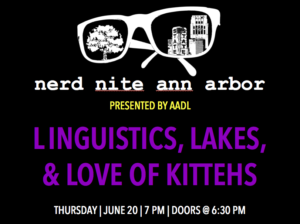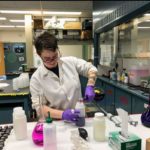 And we’re back! June’s Nerd Nite A2 has it all – little-known language facts, a battle for the GREATEST Lake (water quality issue), and a deep, objective examination of why cats are, scientifically, just the best.
And we’re back! June’s Nerd Nite A2 has it all – little-known language facts, a battle for the GREATEST Lake (water quality issue), and a deep, objective examination of why cats are, scientifically, just the best.
Linguist and standup comedian Emily Rae Sabo will teach us 10 things we need to know about language, including why English spelling is so W-E-I-R-D. Research technician Christine Kitchens will break down the water quality issues plaguing two of the Great Lakes, specifically, too much algae and not enough algae. Cat lover Jessica Amey will discuss feline domestication, variances by breed, and anatomical traits, such as relative cuteness of kitty toe beans.
Join us to laugh at language, marvel at lake ecosystems, and celebrate cats just being cute and great all the time, scientifically speaking, of course. Bring a friend, grab a beer, and settle in for another great NNA2!
When: Thursday, 6/20/19
Doors at 6:30/talks at 7 pm
Where: LIVE, 102 S. First St
Cost: Free! This night out is sponsored by the Ann Arbor District Library!
 Christine Kitchens: A Tale of Two Lakes: Eutrophy in Western Lake Erie and Oligotrophy in Lake Michigan
Christine Kitchens: A Tale of Two Lakes: Eutrophy in Western Lake Erie and Oligotrophy in Lake Michigan
In Western Lake Erie, massive mats of blue-green algae blossom every summer, stirring up memories of the 2014 Toledo Water Crisis with every reappearance. Meanwhile, in Lake Michigan, there are nearly as many invasive mussels in the lake as there are gallons of water. Each mussel is the size of a thumbnail and, under the right conditions, their combined force can filter the entire volume of water in Lake Michigan in less than a week. The resulting crystal clear waters are great for beachgoers but extremely problematic for the lake ecosystem. In this talk, we’ll discuss some of the causes of eutrophy (too much vegetation) in Western Lake Erie and oligotrophy (too little vegetation) in Lake Michigan and how lake-wide management strategies for one problem can exacerbate another.
You speak a language, so you know everything about how language works, right? Wrong! In this talk, we’ll cover the Top 10 things most people don’t know about language. In doing so, I’ll dispel several common myths and reveal some fascinating facts about the systems we use every day to communicate with each other. If you’ve ever wondered how many languages there are in the world, why language death is on the rise, where grammar comes from, or how it is that kids learn language so effortlessly – this talk is for you! Or, if you simply find yourself in need of a few high-quality conversation starters for your upcoming work party, this talk will prepare you to explain what exactly the Bilingual Advantage is, why British accents sound smart, how whistled languages work, whether Spanglish is a language, which high-profile court case was a glaring example of linguistic discrimination, and why English spelling is such a mess.
About Emily:
By day, I’m a researcher and PhD student of Linguistics at The University of Michigan. By night, I’m a local standup comedian at dive bars near you. In my work as a linguist, I compare how monolingual and bilingual listeners respond to various types of lexical ambiguity and speech errors in order to investigate the cognitive mechanisms that underlie language processing as well as the social priming that modulates how people perceive Spanish-accented English in the U.S. today.
 Jessica Amey – Cats: A look into the feisty feline
Jessica Amey – Cats: A look into the feisty feline
We’ll take a look into domestication of cats, cultural influences and a few cat anatomy characteristics. There will also be interactive trivia on different cat breeds.
About Jessica:
Jessica loves cats and will have prizes for cat trivia winners.
